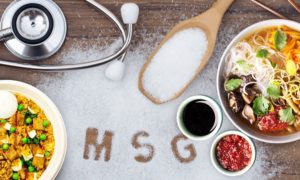
Is MSG Bad For Your Health?
MSG is often criticized for numerous health detriments. Some claims include headache, sweating, heart palpations, burning sensations, nausea, brain toxicity, asthma, liver damage, and the death of all your pets.
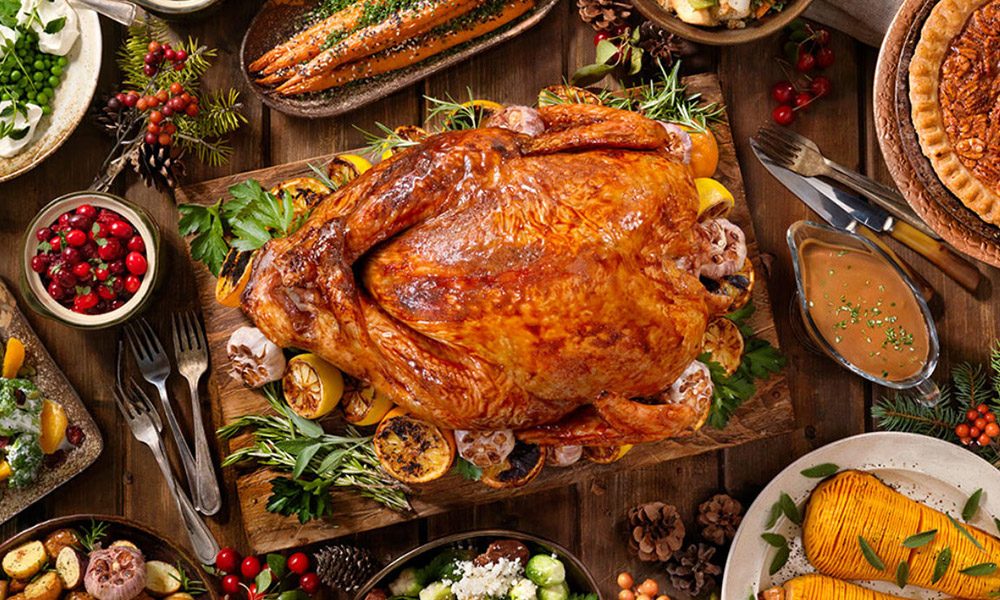
The holiday season is upon us and you know what that means. Food, food, and more food. With endless celebrations, your blood essentially morphs into butter and alcohol from November to January. That sounds pretty fun, but all jokes aside, you’re a bit stressed about how to navigate the holidays. Actually, you’re extremely stressed.
Some people will tell you to abstain from every appetizer, dessert, and alcoholic beverage, but that sounds miserable. You don’t want that.
However, some people will tell you to eat your heart out because it’s the holidays, but that’s got you uncomfortably fatter every year. You sure as heck don’t want to wake up mid-January realizing you took advice from overweight family members who fed you high calorie recipes and now you’re one of them.
So where’s the balance in all this. Well, let me break it down for you using science, practical tips, and some no bs soul searching on how to handle the holidays.
Yanovski et al did a study back in 2000 finding that holiday weight gain is only on average about 1-2 lbs between November and January with the weight gained not being lost later (1). So when people gain weight during the holidays, it typically doesn’t come off.
However, this study is a bit outdated and the numbers don’t paint the full story.
Further research finds the 6-week holiday period accounts for more than 50% of all the weight gain Americans will slap on each year (2). This weight also doesn’t come off when measured during the holiday season next year. To add more sting to all this, studies also find the overweight and obese individuals typically gain more.
So it’s no surprise that if your lifestyle is already unhealthy, the holiday season is amplifying those poor habits.
The most recent studies we have on this topic gives us the most insight (3,4). Children and teens don’t gain weight during the holidays likely because they move more and are still growing. Children also eat more based on hunger as opposed to emotional or social reasons.
Because children don’t gain holiday weight, they bring down the average significantly. Adults alone likely gain more than just a couple pounds especially if you’re already overweight or obese.
One study done in college students in 2006 is particularly eye-opening (5). It found college students in 2006 didn’t gain any weight during the holiday season, but their body composition altered unfavorably. They lost muscle and gained fat which obviously makes their physique and health worse despite no weight change. College students are also in the prime of their hormonal health and despite frequently moaning about being super busy, they actually have far more time and convenience advantages compared to older adults.
So if advantageous college students back in 2006 can have their body composition reverse negatively even without weight gain. Imagine, how much worst it would be for an adult who’s not moving much, stressed about the holidays, losing sleep, and gaining weight in a caloric surplus. This is not even adjusting for modern variables like Door dash and palatable food engineering that have entered the equation in the last decade.
It’s safe to say the average adult will gain quite a bit of fat, lose a bit of muscle, and generally doesn’t get healthier across the rest of the year if the holiday eating is mismanaged.

Well, it depends. One of the few key factors in minimizing or preventing weight gain during the holidays is self-monitoring and coaching (4). The key thing about self-monitoring is the intentionality behind it. Many people aren’t intentional. They’re vague.
They say, I’ll just enjoy myself and lose it all off in January, except they don’t. So the last thing you want to do is to be like everyone else if you want to avoid the outcomes of most Americans.
For starters, people are eating out more and more during this season. There are events after events. Not to mention, single people go on more dates during this season cause they’re cold, bored, and lonely (6). That’s simply the nature of cuffing season.
Anyways, the issue with eating out is that the meals are exponentially high calories. One dish could have your day’s worth of calories or more (7).
So each time you have a social event to attend, here are a few options in how much you’re willing to sacrifice to minimize weight gain or to continue losing weight through the holiday season.
The intention: I’m drinking copious amounts of alcohol and eating my heart out.
The caveat: I will not whine about gaining some body fat and my body retaining lots of water even if it’s more than expected because I chose this path.
What it probably looks like: See food you like? Eat it. If it tastes good, eat more. Repeat with drinks until you pass out. Say no to nothing.
What you should do tomorrow: Go back to your regular nutritious diet.
The intention: I’m going to enjoy myself, but have enough restraint to hopefully only go over my maintenance by a few hundred calories.
The caveat: I still understand this day will set me back 1-3 days, but it’s worth it for me.
What it probably looks like: Eat only one plate of food you enjoy. Enjoy a small dessert and 1-2 drinks (simpler drinks are better). Say no to everything beyond this.
What you should do tomorrow: Go back to your regular nutritious diet.
The intention: I’m going to restrain myself enough to eat around my maintenance for the day.
The caveat: I understand this requires more sacrifice and results in the day being neither a win nor a loss.
What it probably looks like: Keep variety low. Enjoy a few key things that you must have. Say no to everything else.
What you should do tomorrow: Go back to your regular nutritious diet.
The intention: I’m going to try to stay within my calories to keep making progress even through the social event.
The caveat: I will not whine about missing out on some tasty holiday food because I chose this path.
What it probably looks like: Eat your own meal prior to the social event or bring your own dish. A nibble of dessert or sip of alcohol is ok. Say no to everything else.
What you should do tomorrow: Go back to your regular nutritious diet.
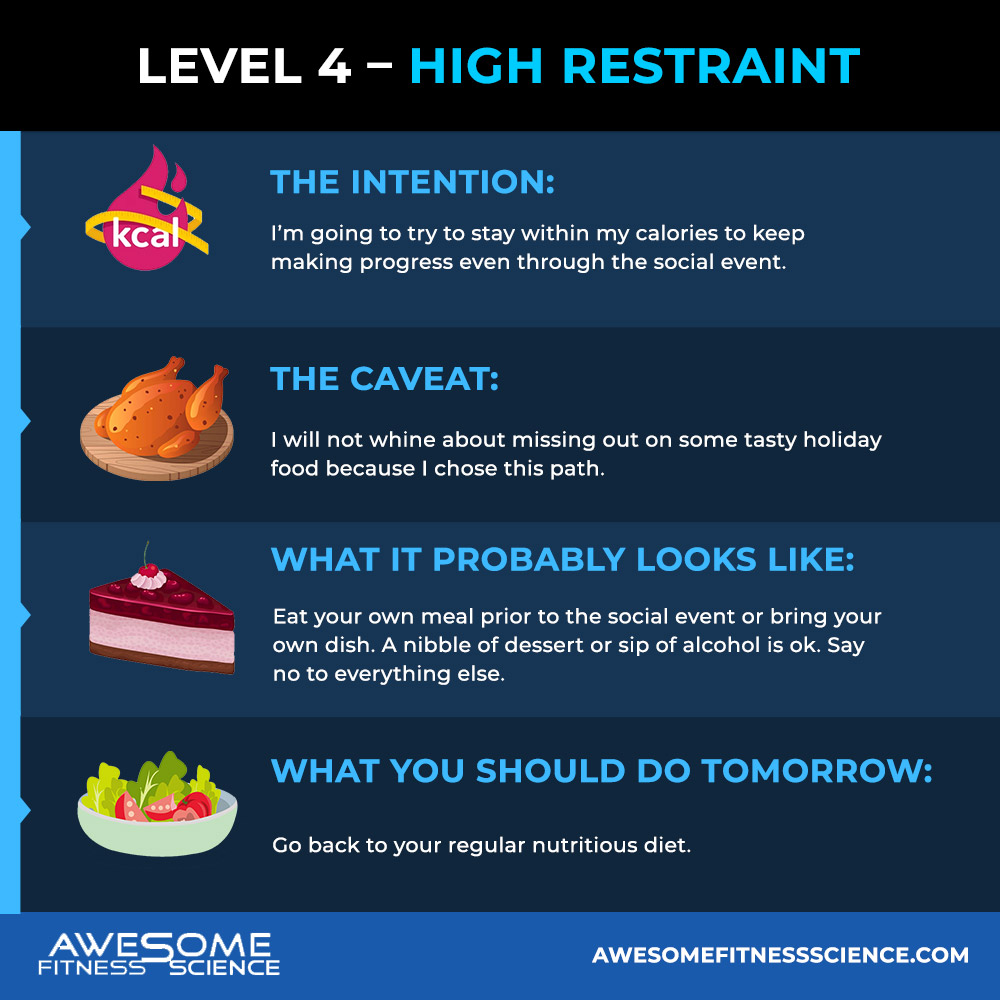
There’s no right or wrong answer to this. It’s a matter of understanding what’s worth it to you given the outcome you desire. But let me make one thing clear that many people don’t get. You can’t have your cake and eat it too. You can’t get results of level 4 with the indulgence of level 1. There’s always a trade off at every social event that you must accept. This is called adulting.
For most people who want to strike a balance between indulging and getting favorable body composition outcomes, I would suggest eating at level 2 for all major holiday events like Thanksgiving or Christmas and eating at level 3 for all other social events.
Where your weight ends up come January will be based on how many social events you attend, your general level of restraint, and the caloric intake in your everyday diet.
If you plan on having some level of restraint at certain holiday events, check out some further tips below.
Grab my free guide on How To Enjoy Social Events While Dieting
Don’t treat the holidays as your last hurrah before you get your crap together in January. A part of your brain will try to rationalize that this season is only once per year, but let’s be real. Your life has been a holiday season. You need some level of restraint or else you’ll turn into a regrettable pile butter come January.
So don’t make things harder for your future self.
Learn to have solid dietary habits now. Consume a calorically reasonable diet most days. Once that’s in place, be intentional about which social events you’ll indulge at and to what extent. Be specific about your planning, portions, and choices. You will still have a great time through the holidays and can avoid unnecessary weight gain.
1. Yanovski . “A Prospective Study of Holiday Weight Gain.” The New England Journal of Medicine, U.S. National Library of Medicine, https://pubmed.ncbi.nlm.nih.gov/10727591/.
2. Academic.oup.com, https://academic.oup.com/nutritionreviews/article/58/12/378/1821459.
3. DA;, Schoeller. “The Effect of Holiday Weight Gain on Body Weight.” Physiology & Behavior, U.S. National Library of Medicine, https://pubmed.ncbi.nlm.nih.gov/24662697/.
4. Díaz-Zavala, Rolando G, et al. “Effect of the Holiday Season on Weight Gain: A Narrative Review.” Journal of Obesity, Hindawi, 2017, https://www.ncbi.nlm.nih.gov/pmc/articles/PMC5514330/.
5. Hull, Holly R, et al. “The Effect of the Holiday Season on Body Weight and Composition in College Students.” Nutrition & Metabolism, BioMed Central, 28 Dec. 2006, https://www.ncbi.nlm.nih.gov/pmc/articles/PMC1766354/.
6. “Home – PMC – NCBI.” National Center for Biotechnology Information, U.S. National Library of Medicine, https://www.ncbi.nlm.nih.gov/pmc/articles.
7. Urban, Lorien E, et al. “Energy Contents of Frequently Ordered Restaurant Meals and Comparison with Human Energy Requirements and U.S. Department of Agriculture Database Information: A Multisite Randomized Study.” Journal of the Academy of Nutrition and Dietetics, U.S. National Library of Medicine, Apr. 2016, https://www.ncbi.nlm.nih.gov/pmc/articles/PMC5746190/.
Grab my free Stupid Simple Scroll to Mastering Hypertrophy

MSG is often criticized for numerous health detriments. Some claims include headache, sweating, heart palpations, burning sensations, nausea, brain toxicity, asthma, liver damage, and the death of all your pets.
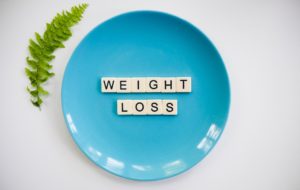
Diet breaks and refeeds are overrated. I know I’ll offend lots of people and frankly, I don’t give a flying fairy about it.
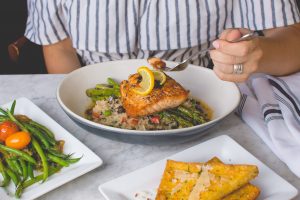
Thermic effect of food. That sounds nerdy doesn’t it? It is totally nerdy and you might not consider yourself a nerd, but trust me, you should be itching to learn about this.